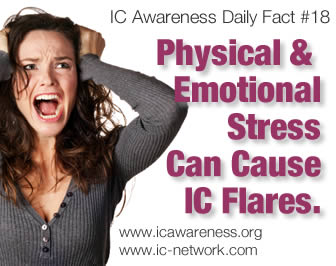Almost every IC patient learns that stress can exacerbate and/or worsen their IC symptoms. When our body is under stress, the “fight or flight” mechanism is triggered. Our body prepares to fight for its life and/or to flee, even in situations that aren’t life threatening. The heart and lungs accelerate. Digestion slows and stops. Blood vessels become dilated in major muscle groups to prepare to run while blood flow is reduced in other parts of the body, such as the gut. Muscles also become tense, particularly the pelvic floor.
Prolonged stress can cause many physical and emotional effects, such as: headaches, chest pain, fatigue, upset stomach, problems with sleeping AND URINARY PROBLEMS. Psychological effects such as anxiety, restlessness, irritability, anger and depression can occur. The most dangerous aspect of prolonged stress is suppression of the immune system.
Physical stress such as a car accident, exposure to cold weather, prolonged vibration while riding in car, or even a fall can trigger symptoms of frequency, urgency, pressure and/or pain. Patients also report flares after major emotional events, such a death in the family, divorce or stress at work.
The most successful IC patients build good stress management skills, including: relaxation, exercise, meditation, gentle yoga, classes in stress and anxiety management and so forth.
Additional Resources
- ICN Emotional Health Center
- Frannie Rose – Reading Frannie Rose is like receiving a hug when you need it the most. She is a patient-advocate, inspirational speaker and writer on chronic illness, spirituality and faith.
- Yoga For Pain Relief – Simple Practices To Calm Your Mind & Heal Your Chronic Pain
- Guided Imagery For Relaxation CD – IC and Pelvic Pain (For Women)
- Guided Imagery to Enhance Healing – Chronic Pelvic Pain or Prostatitis (For Women)
- Coping With Anxiety
- The Mindful Woman – Gentle Practices For Restoring Calm, Finding Balance and Opening Your Heart

